"Dafne And The Rest" Is The BEST Show Talking About Real Problems In Your 30s Right Now
1.It perfectly captures a tough break-up and all the emotions that come with it.
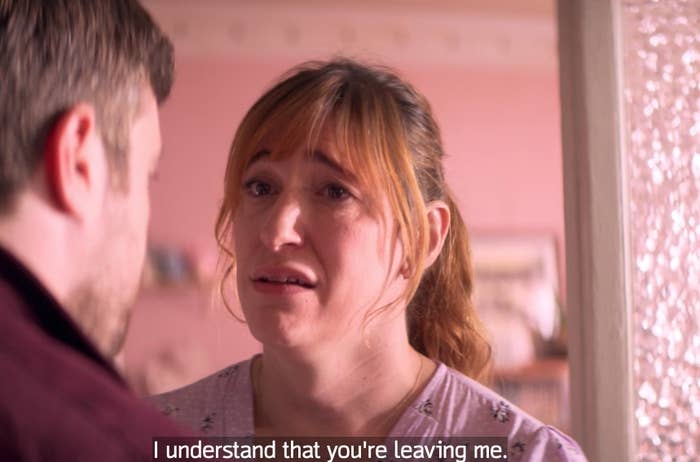
The series begins with Dafne's partner of three years, Manuel, ending their relationship because he is no longer attracted to her. This crushing scene will resonate with anyone who has experienced being broken up with by a long-term partner. It will REALLY stick with those who have been rejected because of their physical appearance or gender identity. Imagine your partner telling you to your face that they're breaking up with you because they straight up don't find you attractive anymore. I just imagined it and almost barfed.
Dafne's world has been turned upside down and must rely on her friends now more than ever, but they're the main characters in their own stories.
2.It explores the nuances of online dating for transgender folks — shocker, online dating sucks for everyone.
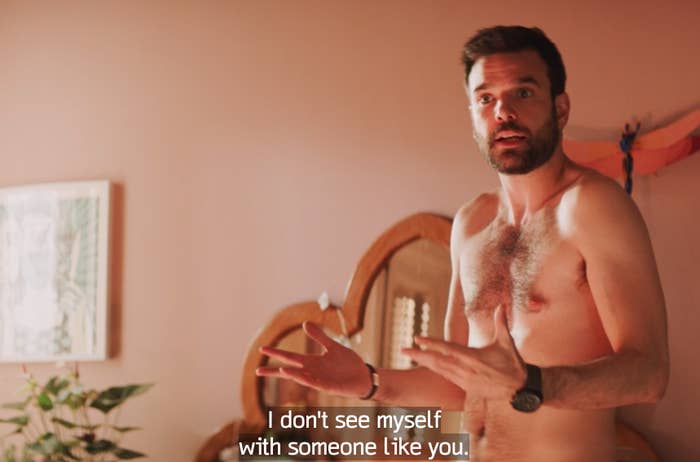
Dafne tries online dating for the first time with the encouragement of her friends. She goes on a date with a cute guy, they sleep together, and she kinda likes him! Unfortunately, immediately after sex he informs her that they will not be seeing each other again. We've all been there. Gotta love Tinder!
But in Dafne's case, the reason is because her date can't see himself with "someone like her." The two then have a frank conversation about their expectations, which brought up a discussion about the "Moral Problem of Ghosting." Should he have just never texted her again? Would she have preferred that? Or did he do the right thing by being honest, even if his reasoning was pretty shitty? I know what I would prefer, and so does Dafne.
3.It sheds light on the societal norm of women faking orgasms and why this NEEDS TO STOP!
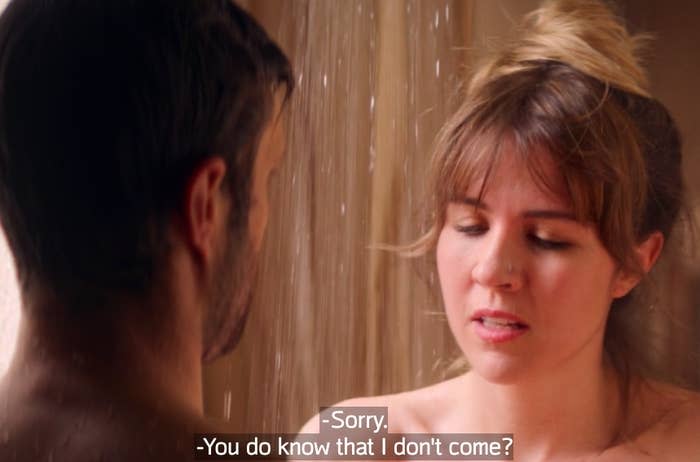
Martina just got engaged to Dafne's roommate, Cesar. They seem like a perfect couple — both are good-natured, mature, independent, and freakin' adorable. There's just one problem, which Martina blurts out to Cesar in the shower one morning: she doesn't finish. She blames herself, saying it's her fault because she makes "all these little sounds" which makes it sound like she's coming. But she's not. Not even kinda.
This scene will really hit the spot (sorry) for anyone who has ever faked an orgasm before. Why do we do it? Why can't we just say it's not going to happen this time or I need a vibrator to come, let me grab it from my drawer of sex things or if you go a little faster/harder/softer/slower I'll come. And can't sex still be enjoyable if you don't come every time? For *some people* it can take awhile and sometimes you got other stuff to do and just wanted a quickie.
4.It explores the modern phenomenon of being "sober-curious."
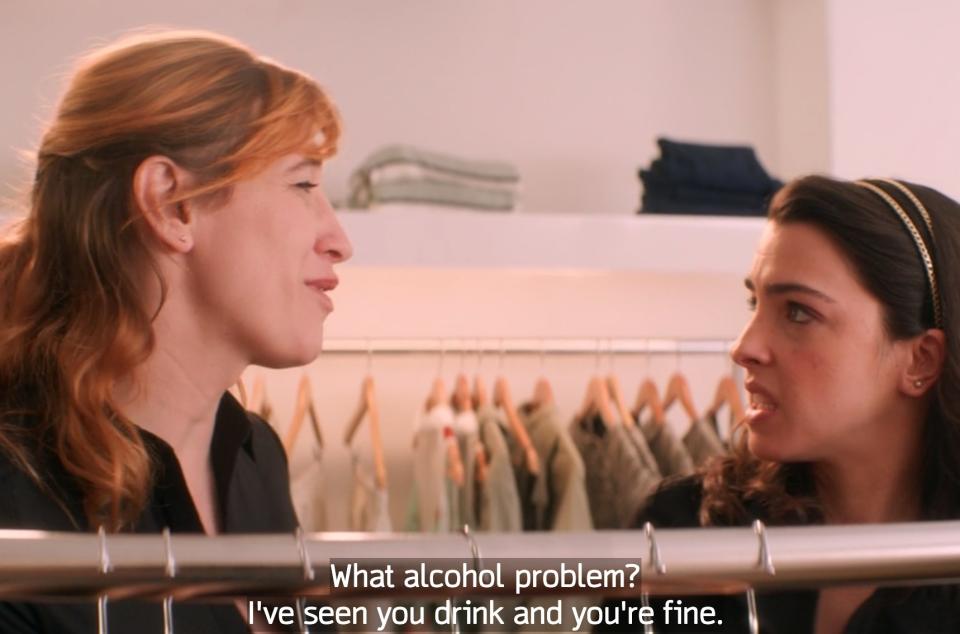
Amaya, one of Dafne's close friends, has been thinking about her drinking lately. She wonders if she might have a problem with alcohol because she can't go out without drinking. But does that mean she's an alcoholic and needs to pour all her wine bottles down the drain, and then go sober? Our generation's attitudes toward drinking have been shifting recently, and this series is the first time I've seen it addressed so thoughtfully.
Like most things, this is not a black and white issue. What's the difference between a drinking problem, a problem with drinking, drinking "too much," or being a full-blown alcoholic? What's the line between needing to be 100% sober or needing to just cut back a bit? Like with Amaya, most of these questions never get asked out loud and simply echo in our brains as we pour ourselves another drink. Let's start the conversation.
5.It examines how friendships evolve as we grow older and into newer versions of ourselves.
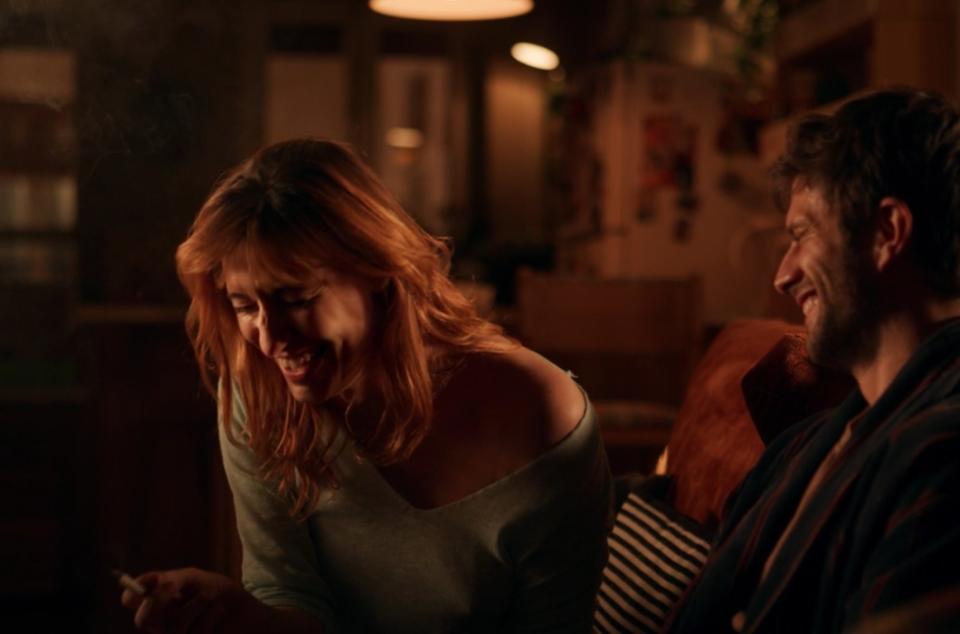
Make new friends, but keep the old — is that how it goes? If everyone kept making new friends AND keeping their old friends, that would mean the average 30-year-old would have approximately 500 friends. And we all know that ain't the truth. Dafne and her friends are lucky to have such a tight-knit circle of friends, especially in their 30s, which is typically when people mate and flee to the suburbs to raise their young, never to be seen again by their friends. Which is why it's so hard to admit it when you straight up don't like one of your friends anymore. Like you'll see them, probably, because they're in the group. But you wouldn't mind if your one-on-one hang outs dwindled or just... stopped entirely. Or maybe it's the other way around and you can feel one of your friends pulling away, but you have no idea why. It sucks, but it's an uncomfortable part of life and also one that Dafne has also found herself in.
6.It reminds us that happiness comes from following your passions, even if you think it's too late.
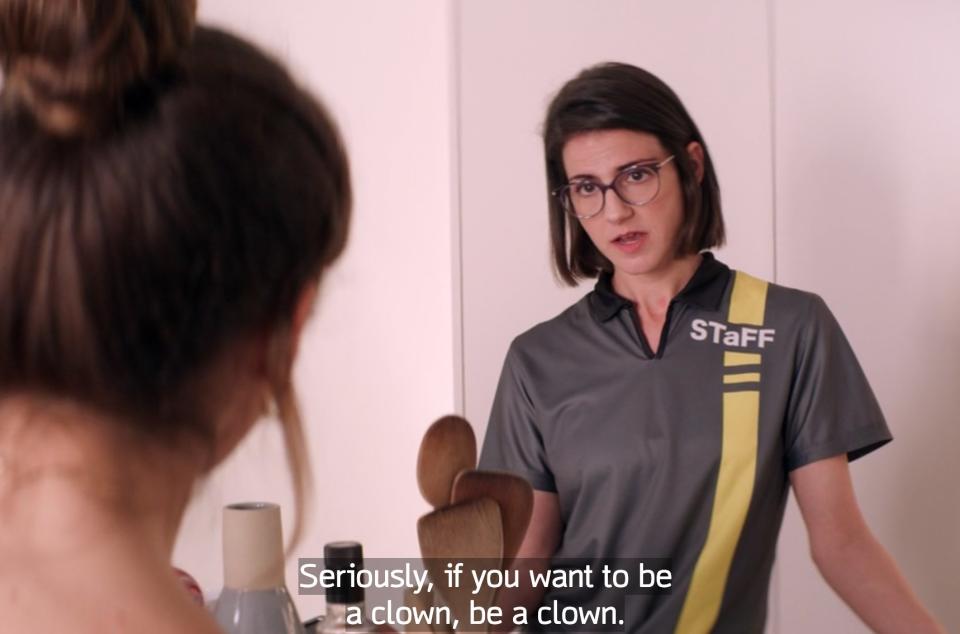
Eva, like a lot of people in their 30s, is having one of those classic WTF am I doing with my life? moments that we experience every few years (or months, if you're me). She's pretty happy with her life — she has a job, she has a boo, she lives in a great apartment with her closest friends. Just one small detail, she hates her job. Actually, she hates most jobs, because even though they pay her bills, the soul-sucking part of it just doesn't seem worth it anymore.
We grew up being told "do what you love," but what if what you love is a career that doesn't pay you enough to survive? What if you want to be an actor, dancer, writer, comedian, careers that, except for the most talented and connected 10%, will never provide you with a stable income. In Eva's case, she wants to be a clown. To which her supportive friends say, "If you want to be a clown, be a clown." And to that I say, it's never too late to be a clown (but don't quit your day job just yet).
7.It brings up an important question of what society considers to be "real sex."
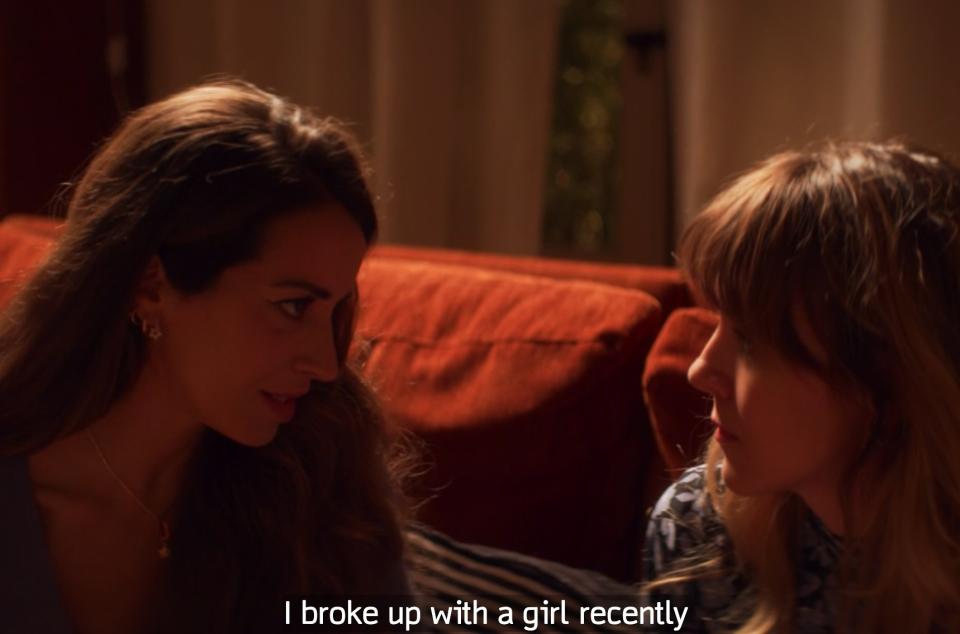
Raquel is a friend of Dafne's, a waitress, and a "bona-fide lesbian." She struggles with the common trope of falling for a straight girl, but this segues into an important plot point surrounding societal views of lesbian sex. Plenty of people are in open relationships these days, or they're in relationships with open-minded partners who acknowledge that sexuality is a spectrum, love and sex can exist separately, and who respect their partner's needs and desires.
I can't count how many times I've been told that a couple is married, but the woman is free to explore sex outside their relationship — as long as it's ONLY with women, not men... Why not men? Are they afraid the other man will have a bigger dick and their wife will leave? Do they worry the other man will stretch out her vagina (which is obviously not possible) or give her an STD? Or is it because they think when two women have sex it's not "real sex"? If you're okay with your wife sleeping with another woman, but not with a man, you might want to think about why.
8.It hits home on "the talking stage," that awkward period of time when you can't tell if someone likes you or not.
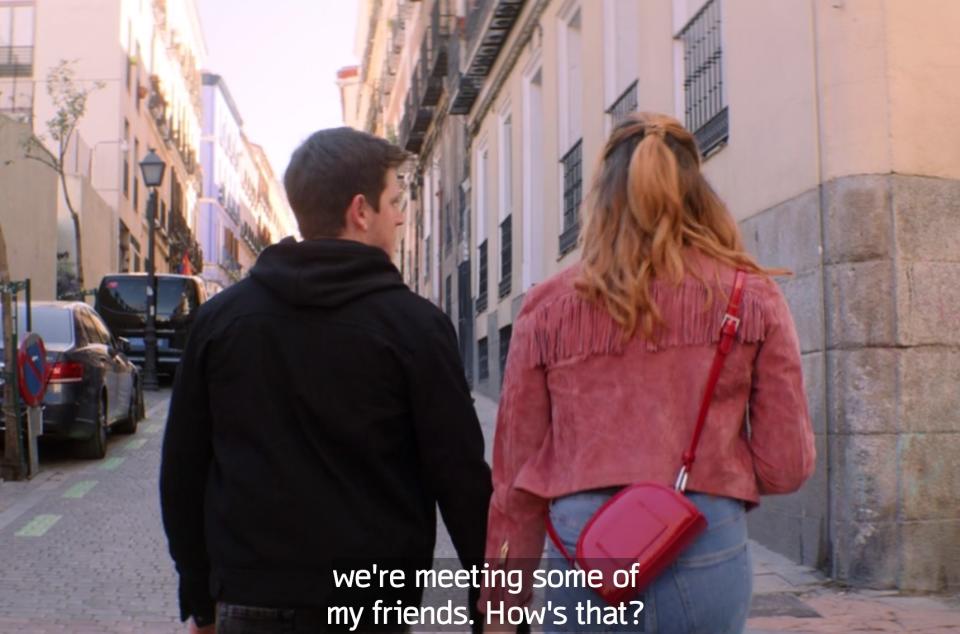
Dafne gets her groove back and starts seeing someone, but has zero idea of what to expect. She's still a bit rattled from her first online dating experience and is proceeding very cautiously. This guy seems nice, though! He's sweet, great in bed, and even introduced her to his mom. But Dafne's in peak "talking stage" spiral. Does he actually like HER? Or is this just how he is with everyone he dates? Does he LIKE her? Or is he just horny and wants to bang someone for a few weeks? Does he like her? Or is there an ulterior motive here?
The last time I was in the talking stage, I thought up 1,001 alternate theories of why this person was spending time with me. Sometimes, Occam's razor prevails and the person actually digs you. Other times, they just needed a date to their cousin's wedding. But every time, the talking stage sucks and Dafne's experience is all of ours.
9.It explores how sexual politics can differ based on gender and sexual orientation.
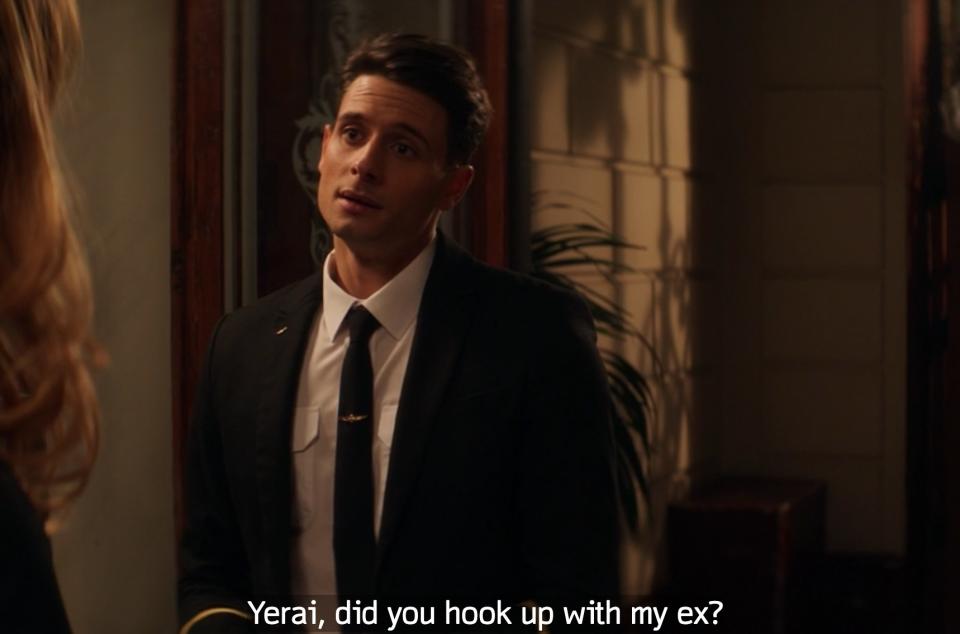
Dafne is blindsided when she finds out that one of her close friends slept with Manuel, her ex, after they broke up. She is furious as I would be too. We are taught about "girl code," that thing that says it's against the law to sleep with one of your friend's exes. Like ARE YOU KIDDING ME, BRO? But this is a stark contrast from the commonly accepted narrative that in the queer community, sleeping with friends' exes is usually not a faux pas.
In fact, it's even joked about how some queer communities can be pretty incestuous. I'm not saying there is a right or wrong, but it is interesting to note that Dafne subscribes to the (female-coded) "girl code" while her gay male friend seems to think it's no big deal. Lots to unpack here and there's plenty of thoughts to be had on both sides.
10.And there are beautiful people speaking beautiful Spanish in beautiful Spain.
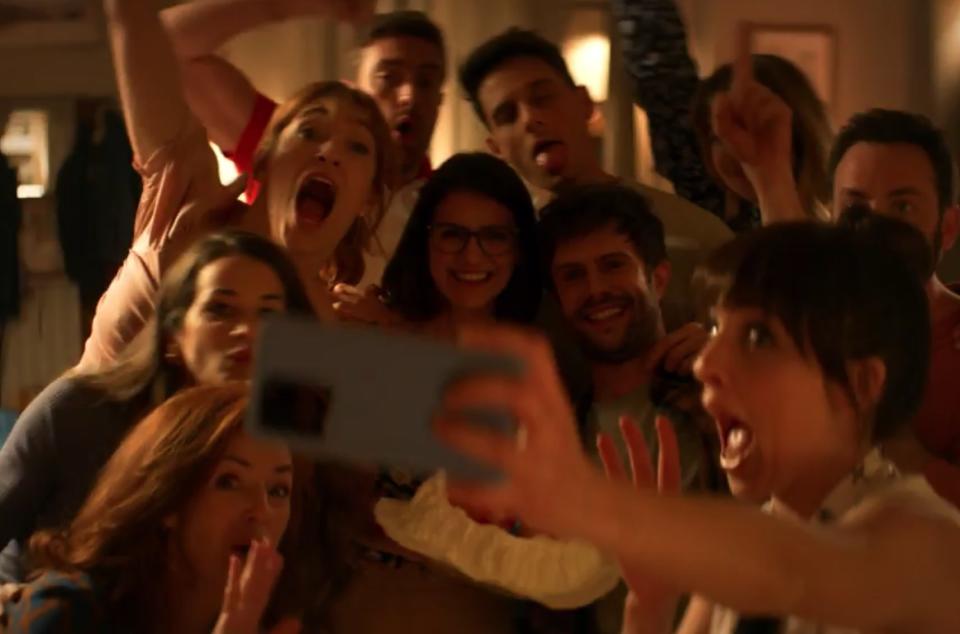
Not much else needs to be said here, but it just so happens that everyone on Dafne and the Rest is adorable. Please do yourself a favor and watch with the Spanish audio, NOT the English dub. The language is gorgeous to listen to and is helpful for anyone trying to brush up on their Spanish comprehension. English subtitles got you. And finally, the backdrop of Madrid doesn't hurt.